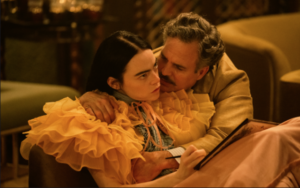POOR THINGS: 4 ½ STARS. “simultaneously hilarious, sympathetic and disturbing.”
 “Poor Things,” a new Gothic drama starring Emma Stone, is one unique woman’s journey through science, sex and self-discovery.
“Poor Things,” a new Gothic drama starring Emma Stone, is one unique woman’s journey through science, sex and self-discovery.
Based on Scottish writer Alasdair Gray’s 1992 novel, and set in 19th century London, the story focusses on Bella Baxter (Emma Stone), who, when we first meet her, is a fully grown woman with the mind of a child. Her “mental age and body are not synchronized,” says her guardian, Dr. Godwin Baxter (Willem Dafoe) a.k.a. “God,” a disfigured man of science with an unconventional mind.
They live in a lavish home, which also houses Godwin’s menagerie of strange animals, like a half chicken, half dog, creations right out of the Island of Dr. Moreau, and an ever-patient housekeeper who cleans up after Bella’s frequent temper tantrums.
When Bella isn’t acting out, she soaks up knowledge like a sponge, wearing her curiosity like a badge. To chart her progress Godwin recruits his protégé Max (Ramy Youssef), a young scientist with an open mind and an open heart.
As Max develops feelings for the young woman, Bella becomes curious about the world outside the walls of Godwin’s home. She gets the chance to explore with lawyer Duncan Wedderburn (Mark Ruffalo), a flamboyant character who accompanies the now free-spirited Bella off on a romantic, picaresque excursion to Lisbon, Portugal. For the rapidly developing young woman, everything is new and she dives into every experience, including sex with gusto. “Why do people just not do this all the time?” she says to Wedderburn post coitus.
Her journey to self-discovery, free from the prejudices of polite society, sees her plot her own way to liberty by working as a Parisian prostitute, studying medicine, expanding her mind with the writings of Emerson and travelling the world. “I am finding being alive fascinating,” she says matter-of-factly.
An off-kilter “Frankenstein” story, “Poor Things” is the darkly funny tale of a human experiment who is not beholden to her creator. Unlike Frankenstein’s monster, she has a lust for life, an eagerness to drink from the chalice and savor every drop. From figuring out how to walk, spitting out food she doesn’t like—“Why keep it on my mouth if I find it revolting?”—to running off to an uncertain future, she finds freedom in the moment, and the zest with which Stone brings Bella to life is irresistible. “Ideas are banging in Bella’s head like lights in a storm!” she says.
It is a raw, strange performance, fearless in its execution. Rich in comedy—it takes a well-defined character to say, “I must go punch that baby,” and get away with it—and deep in pathos, Bella is the kind of character that we’re likely only to see in a film by Yorgos Lanthimos, director of oddball delights like “The Favourite,” “The Lobster,” “The Killing of a Sacred Deer” and “Dogtooth,” but it is Stone who makes the character simultaneously hilarious, sympathetic and disturbing.
Stone is supported by Dafoe as a mad scientist who wouldn’t be out of place working alongside James Whale or Tod Browning. It’s a bravura performance, under an inch of monstrous make-up scars, that reveals the human side of a man mostly interested in data, but who makes a space in his heart for Bella.
Ruffalo lets it rip, gleefully embodying the worst of humanity. The old money lawyer is braggadocious, uptight and a bit of a dim wit. The Avengers actor milks Wedderburn for all he’s worth, emphasizing his ridiculous suaveness to create a comedic character that is part Errol Flynn, part Derek Zoolander.
The success of “Poor Things” is due to that trio of performances laid against Lanthimos’s ornate set design and odd-ball sensibility. It is a coming-of-age, a long strange journey unlike any other, but one with a strong message of female agency. “A woman plotting her course to freedom,” says brothel owner Swiney (Kathryn Hunter). “How delightful.”
How delightful, indeed.
